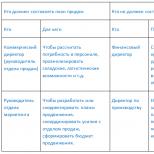Sales plan business plan
If you need to draw up a sales plan, the business plan must start with a study of the market, as well as the product that interests you. Immediately, we note that there are no universal plans that would instantly increase sales. In each case, there is some peculiarity that a person must take into account, and the sales plan will depend on this. A business plan, with the right approach, will only help to define the boundaries of opportunities and maximize implementation, but no more.
If you need to draw up an effective sales plan, the business plan should start with old customers or existing ones in order to calculate the situation as much as possible. Examine how much production you are already selling, this will be the average for future observations. Next, you need to improve the sales plan, the business plan provides for the study of relationships with existing customers. After studying it becomes clear what needs to be foreseen to increase the turnover. When the business plan for selling with old customers is fully taken into account, it is possible to take on new customers and examine their needs. An effective business sales plan can significantly increase the company's profitability, and this is the main indicator for an entrepreneur.
How to make a sales plan
There is no universal and absolutely precise sales plan. There is always an element of chance. However, a well-written plan will help you define your limits and make the most of what you have.
The new year in the company begins with the sales plan and the old one ends with it. This is a defining document that helps to adequately assess the limit of commercial opportunities - what you can achieve with maximum effort and correlating desires with real opportunities. Therefore, it should be borne in mind that, when forming a plan, we are dealing with a comprehensive assessment: on the one hand, this is planning sales to new customers, on the other, maximizing shipments to existing ones. Let's start with what is easier.
Maximum - from old clients
By planning sales to existing customers, you can estimate how much goods or services they need on a monthly basis. Estimate the normal (average) volume of supplies and the maximum possible. As a result, we get a plan-norm.
After analyzing the relationship with customers, the dynamics of their orders, the commercial director can find arguments for negotiations to increase supplies. Next, you need to assess the likelihood of such an increase and determine the total number of expected orders, which ultimately will give the maximum plan. In some cases, using this method, you can seriously increase the turnover and income of the business. Thus, a licensed manufacturer of children's clothing, planning sales for a year, held negotiations with all existing customers. One of them was Metro Cash & Carry, which received goods for $ 200,000 a month. The manufacturer offered to increase supplies to $ 1 million. As a result of negotiations, they agreed on $ 800,000. The volume of sales quadrupled. Negotiations with some other clients were also successful.
New clients
Planning sales to customers that have yet to be won is more challenging. It would seem, how can a plan be assessed if neither the number of clients, nor the results of negotiations with each of them, nor the volume of their orders are known? In fact, setting a plan is just as important in this case as it is when collecting payments from existing customers.
Is it very likely that for a particular employee within a month all negotiations with new clients will turn out to be unsuccessful and the sales volume will be zero? Yes, but the next month the situation will most likely be different, since it is unlikely that the company's management will keep at work employees who show zero results month after month. It turns out that in order to ensure sales growth, the capabilities of specific managers are put at the forefront and the human factor plays a key role.
In most cases, it is wise to set three levels of personal plans - for the newbie, the experienced employee, and the sales expert. The higher the level of the plan, the higher the salary of the sales manager.
This means that when calculating the sales plan, in this case, one should be based not on actual data on the volume of transactions, which we do not yet have, but on personal sales plans that must be prepared for the employees of the department.
Down with personal minimum
What should be the personal sales plans so that they support the revenue budget of the entire sales department? It is tempting to agree on a personal plan with each manager. However, this is fundamentally wrong. Indeed, with this approach, each employee of the sales department, finding a thousand reasons, will convince the management of the need to set the lowest bar possible. Agree with him? In no case! With the same success, you may not set any personal sales plans at all, and your employees, having earned the minimum acceptable money for themselves, will consider that their personal plan is fulfilled, while your business will go to hell.
Who should and who is contraindicated to draw up a sales plan

To ensure sales growth, the capabilities of specific managers are put at the forefront.
By ability
A personal sales plan doesn't have to be the result of an agreement. It is based on the analysis of a number of indicators.
The first is the individual abilities of a particular manager. In most cases, it is wise to set three levels of personal plans - for the newbie, the experienced employee, and the sales expert. The higher the level of the plan, the higher the salary of the sales manager. But a bonus from sales - the commercial percentage of sales with an increase in plans and salary, you can not only not increase, but even in some cases decrease.
The second factor for calculating personal plans is identifying the average monthly volume for each employee based on the experience of past sales (how many transactions and for what amounts a manager can make a month).
As a result of these simple calculations, you will determine that in your department there are, for example, two newcomers, two strong middle peasants and one strong merchant - a sales expert. Do not forget to include yourself if in your company, like in ours, the leader is obliged to personally participate in generating income and, on an equal basis with everyone, has a personal sales plan at a level not lower than that of his most experienced subordinate.
Determining the plan-rate for the annual sales volume for the entire department, feel free to summarize the data for the month and multiply by 12. This is the minimum that you must provide.
Three plans
I know from experience that it is much smarter and more efficient to set not one plan for the sales department, but three.
The first is the minimum plan. We calculated it a little earlier. Its implementation is an acceptable result, but we are definitely not talking about a feat. If it is not fulfilled, the results of the work of the sales department should be considered unsatisfactory and serious work should be done on correcting the errors.
The second plan is the norm. This is our minimum plus a coefficient that determines the level of further intensification of work. We have defined it as 1.2-1.3. Thus, we assume a 20-30% increase in sales, from now on it becomes the norm and gives a realistic assessment of our potential. If the norm is fulfilled, the work of the department should be recognized as worthy. Employees provided income that was close to the maximum possible.
And finally, the maximum plan. Outstanding Sales Achievement. If your team is following this plan, the first thing you want to say is, “Well done! Heroes! " If the maximum plan is reached a second time, this is a sure sign that the entire system of plans needs to be revised upward.
Effective motivation
Don't be in a rush to announce your overall sales plan to your employees. They are unlikely to pay attention to abstract numbers and percentages. They will be interested if you reflect all personal plans in a concrete and visual document - in the order for the remuneration of sales managers. Moreover, this order should stipulate tough financial measures for those who thwart plans, and bonuses for those who successfully fulfill them. A comprehensive assessment of the work of each manager assumes that for the same deal he can receive less money if he has not fulfilled his personal sales plan this month, more money if he has fulfilled, even more money if the general sales plan for the department is fulfilled.





